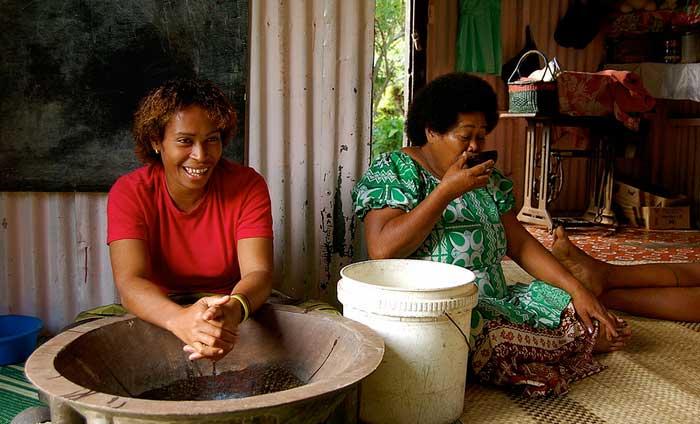
I use traditional psychiatric medications all the time, and believe they can be very helpful, but some people may have side effects from these medications, or prefer something more natural.
Today, I am going to profile kava, a natural plant-based compound effective for treating anxiety.
What is Kava?
Kava is a plant indigenous to the Western Pacific and used throughout Polynesia, Fiji, Papau New Guinea, Micronesia, and Vanatu for cultural and medicinal purposes.
Traditionally, the roots are ground, chewed, or pounded, and then mixed with water to create a starchy drink. In the United States, kava is available in pill-form as a supplement.
The pharmacology of Kava
Kava works primarily by altering the activity of gamma-aminobutyric acid, or GABA, which is the primary inhibitory neurotransmitter in the brain.
GABA is the same neurotransmitter system that alcohol and benzodiazepene medications (such as Xanax and Valium) affect, which give those compounds their relaxing properties.
However, unlike alcohol or benzodiazepenes, Kava also affects the norepinephrine and dopamine neurotransmitter systems, and therefore does not have the same negative cognitive effects as those drugs do.
You get all the relaxation without the tiredness, impairment, or mental dullness. Sounds like a pretty good deal to me!
Does Kava work?
According to the research and my clinical experience, it does.
In 2002, a meta-analysis examined all the research studies ever done on Kava as a treatment for anxiety (it was a Cochrane review, considered to be the highest standard for scientific reviews), and demonstrated that people who took Kava had significant reductions in anxiety over placebo.
More recent studies have also confirmed the effectiveness of kava. In 2013, researchers at the University of Melbourne published an article demonstrating that individuals with generalized anxiety who took kava had moderate, but statistically significant, reductions in anxiety. As a bonus, kava also seemed to improve sexual function (as opposed to SSRIs, which help anxiety but frequently cause sexual side effects).
This study also showed that kava had no side effects and no evidence of addiction or withdrawal.
Are there any downsides?
In most studies, including those examined in the Cochrane review, side effects were uncommon, and when they happened, were mild and transient.
However, if you live in Canada, the European Union, or the United Kingdom, you might have a hard time getting your hands on some kava, because it is banned. This is because in the past there have been rare, but extremely serious, case reports of kava being associated with liver failure and death.
As more studies are done, though, it seems that these rare cases are likely related to factors such as poor quality kava (mixed with adulterants or impurities) and the use of kava with alcohol or medications that cause liver toxicity.
The lesson? If you’d like to try kava, make sure to discuss the decision with your doctor so he or she can make sure it won’t interact with any medications you’re taking or medical conditions you have, and choose kava that was purified using a water-soluble extract, as opposed to alcohol or another chemical.
Could Kava be right for me?
It could be. If you have mild to moderate anxiety, and prefer a natural treatment over a pharmaceutical medication, kava could be right up your alley.
How to take Kava
- A typical dose is 1-3 tablets twice a day (for a total daily dose of < 250mg of kavalactones/day).
- Kava is safest when used for short-term or intermittent basis.
- Make sure your kava is from a reputable source and is water soluble (Consumer Labs is a great website that does independent testing of various herbal supplements).
- Avoid taking kava with alcohol, benzodiazepenes, or Tylenol (acetaminophen).
- Check with your doctor if you have liver disease or are taking medications that could impact the liver.
What about you? Have you ever tried kava? I’d love to hear about your experience in the comments!
***
Photo by Brian


Some years ago I tried Kava Kava and found it great for anxiety. The only problem I have now though is that is has been banned from sale in the UK for a number of years (since 2003) because of a number of cases of liver damage.
Hey Chris, thanks for your comment. When I heard a lot of this research about kava at the last annual APA meeting, the speaker emphasized the problem of it being banned in the UK and the rest of Europe. It’s not entirely clear what caused the cases of liver damage, but it’s possibly related to adulterants during processing, so more research needs to be done on the soluble formulation.
Thanks for this informative post! A question: is kava contraindicated for meds other than benzos or Tylenol? I’ve got several clients who are being treated for Bipolar Disorder, but who still struggle with intermittent anxiety — would love to pass along this information.
Hey Melanie! There are some mood stabilizers that can impact liver function, so it’s not necessarily contraindicated, but it would be a good idea for your client to have their psychiatrist follow liver function to make sure it doesn’t get out of whack with kava. Hope this helps!
I looked into Kava years ago, but for some reason I thought that the liver problems were significant.
Hey Dr. J, the problem with the liver effects is that they are extremely rare, but extremely serious or even fatal when they happen. To my knowledge all of the case reports where there was liver failure there was also another factor besides kava (medications, alcohol, pre-existing liver condition, etc). So it doesn’t seem that kava causes severe liver problems on its own. There is also some thought that there could be genetic polymorphisms that cause sensitivity to kava in certain people. Either way, there does appear to be therapeutic value to kava, but it needs to be studied more, too.
What about KAVA for teens? I have a 13 yr old with anxiety and is currently taking Zoloft.
Hi Jan, I’m not familiar with the research on kava in teens – I’d recommend checking with your teen’s psychiatrist or primary care doc to see if they have any knowledge about it. It’s great that you are investigating all treatment options for your child!
Hi there,
I am replying to Jan, my son is 15 and suffers terribly from anxiety, he is currently on prozac, and is also drinking kava. the kava helps him a lot, but was wondering if you Jan have found anything out about the zoloft and kava for your daughter? thanks for any input,
julie
Would you happen to know where I can find it in LA?
Do you know if it’s ok to drink the kava tea and take a Gaba with B-6 500mg supplement together at night. This herbal tea states on the box there is 78mg the kava root extract in the tea along with a blend of other herbs. It’s the Yogi brand kava stress relief tea.
What is your current view on taking Kava root caps for someone who had depression and hi anxiety but who’s ended up in the hospital & given several pints of blood because of overuse of Acetaminophen ?